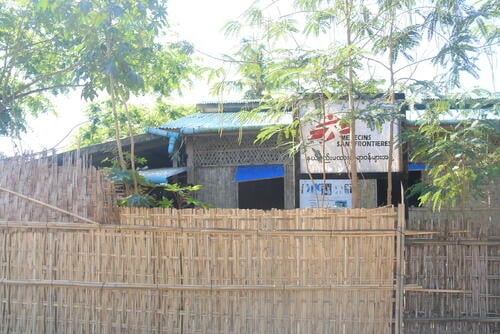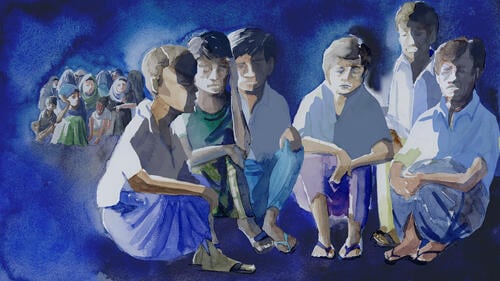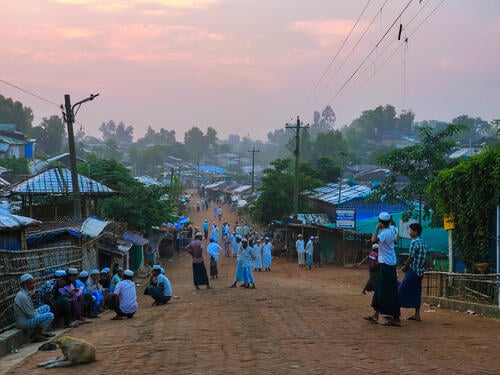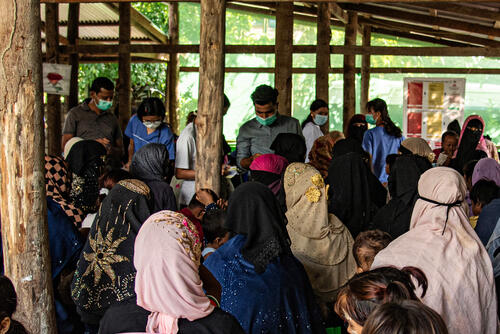In June, Médecins Sans Frontières (MSF) was forced to indefinitely suspend our medical humanitarian activities in northern Rakhine state, Myanmar, following the extreme escalation of conflict; MSF’s office in Buthidaung was burnt down. While MSF has been able to maintain a minimum level of activities in some townships in the central part of Rakhine, our teams in those areas also struggle with severe access restrictions, and the consequences of violent conflict. Here are some of the major challenges in healthcare provision we are facing in Rakhine.
Teleconsultations means a lot to the people since this is the only contact left between the community and MSF.Caroline de Cramer, the outgoing project medical adviser
Difficulties in accessing patients and delivering healthcare
Since November 2023, when the conflict between the Myanmar military and Arakan Army resumed, MSF teams faced major difficulties in accessing patients. For eight months, MSF did not have authorisation to run any mobile clinics in Rakhine state, including in the displaced people’s camps in Pauktaw, where MSF is often the only healthcare provider. These camps are only accessible by boat, but with the escalation of conflict in Pauktaw, our teams could no longer travel to provide healthcare, nor could patients in need of emergency care reach the hospital in Sittwe.
This presents a major issue for patients with chronic health problems, emergency needs, and women with complicated pregnancies. In June, MSF received travel authorisation to resume our mobile clinic for a month in the mainly Rohingya Aung Mingalar neighbourhood in downtown Sittwe. Our teams are operating here with reduced capacity, including due to severe supply constraints. Our clinics in Pauktaw and other in towns remain inaccessible for the time being.
Travel restrictions are not affecting just MSF, but also other organisations and institutions providing lifesaving assistance and healthcare. MSF is no longer authorised to send any medicines to the camps in Pauktaw. Our community staff have managed to continue the provision of basic health services, but it is difficult to provide patients with basic healthcare, as medical supplies dwindle and medical staff can’t reach them.
When patients can reach out to a nurse, health promotion officer, or doctor, it is a form of mental health support.Caroline de Cramer, the outgoing project medical adviser
Emergency referrals blocked
Before the resumption of the conflict in November 2023, when people in the camps or villages supported by MSF needed hospital care, they relied on our teams to provide emergency referrals, including pick up of patients and transportation to hospitals by car or boat. This is no longer possible due to travel restrictions imposed by the authorities, leaving people without the option of receiving specialised medical care.
For people attempting to reach hospital independently, the journey is fraught with difficulty. For patients in Pauktaw, reaching Sittwe by sea is practically impossible, while healthcare services available to them in other towns are limited, equally affected by the conflict, and often require an even longer journey.
People sometimes die on the way to seek healthcare or because they cannot even attempt the journey due to the prohibitive cost and difficulty of travelling. As a result, MSF has seen an alarming trend in maternal and neo-natal deaths. In January, our teams reported the deaths of a mother and her twins, and of two mothers who each lost a baby because they were forced to deliver at home. In June, our teams reported the death of another mother who was unable to receive antenatal care since April. She was scared to leave the displacement camp in Pauktaw due to the road blockages.
It’s only way for them to feel that they are not forgotten, that we are still present, and that they can count on us.Caroline de Cramer, the outgoing project medical adviser
Public healthcare facilities no longer function
Since the resumption of the conflict, many health workers have left their jobs in public healthcare facilities, mostly due to safety and security issues. This has forced some facilities to close completely. Those that are still open struggle to function due to shortages of staff, medical supplies and fuel. Electricity networks no longer supply power in Rakhine, so health facilities depend on generators, but fuel to run them is not easily available due to supply routes being disrupted or cut off, impacting their ability to perform medical procedures.
Lack of phone signal makes teleconsultations challenging
To reach patients, MSF medical teams provide consultations by telephone or text message. However, this also poses a challenge, because phone networks are often disrupted, resulting in intermittent and very weak phone coverage across many areas. Patients and community volunteers often need to walk long distances or climb hills to try and get a phone signal.
“Teleconsultations means a lot to the people since this is the only contact left between the community and MSF,” says Caroline de Cramer, the outgoing project medical adviser. “When patients can reach out to a nurse, health promotion officer, or doctor, it is a form of mental health support. It’s only way for them to feel that they are not forgotten, that we are still present, and that they can count on us.”






